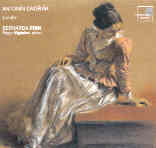Dvorák wrote nearly 100 songs, and you would think that singers would show some interest in classical music’s greatest tunesmith after Schubert. Unfortunately several factors have counted against this very logical assumption, among them Dvorák’s undeserved reputation as a failed opera composer, the difficulty of the Czech language, and his reputed clumsiness as a keyboard writer. Happily today these misperceptions are changing: we accept that several of Dvorák’s operas (Rusalka first among them) are marvelous, that Czech is a language that singers are expected to know (thanks largely to Janácek’s newfound international popularity), and that whatever the awkwardness of Dvorák’s keyboard style from the performer’s standpoint, there’s nothing at all wrong with it from the listener’s.
Now consider the music itself, which is gorgeous. Indeed, this is without question one of the finest Lieder recitals to come along in many years. Argentine mezzo Bernarda Fink is completely comfortable singing in Czech, and her voice sounds as open, lovely, and unaffected as the songs themselves. Some of them, such as the Gipsy Songs Op. 55, are reasonably well known. But real buried treasures also reside here, such as the two songs from Op. 2, more familiar in their “Cypresses” string quartet arrangements. Songs from the Dvur Kralové Manuscript Op. 7 includes such utterly delightful (and delightfully sung) items as “The Lark” and “Strawberries” (a Slavonic Dance for voice and piano in all but name). In Folk Tone brings the Czech element to the fore, while the love songs of Op. 83 express tender sentiments that, thanks to their melodic freshness and Fink’s supremely natural delivery, never turn maudlin.
Roger Vignoles, certainly one of the finest accompanists around, treats the music with the care and respect that it deserves. And admit it: the watery figurations of Op. 73’s “At the Brook” convey just as much atmosphere and color as anything by Schubert or Schumann, don’t they? In the end, though, this is Fink’s show, as purely enjoyable a 68 minutes of polished vocalism as I ever hope to hear. The desolation she conveys in The Abandoned Maiden (from Op. 7) is all the more poignant for being expressed through elegance of line and delicately shaded tone color rather than through vocal histrionics or self-conscious mannerisms. She posseses in abundance that “inward” quality characteristic of all great Lieder singing, and Harmonia Mundi has given her and Vignoles perfectly balanced, natural sonics.
Fine notes along with complete texts and translations are included, though I don’t understand why the title of the second of the Gipsy Songs looks perfectly normal in French and German but comes out as “I Chant My Lay” in English. It’s high time we got past the need to turn these texts into those grotesque parodies of bad Victorian verse that masquerade as “singing translations”. In too many cases the listener would almost find it easier (and certainly less embarrassing) to puzzle out the German or French than to rely on the “poetic” English. Try this literary wonder: “How great and good the blessing lies in true labour here! In sorrow all depressing, an angel all caressing, she drieth tear after tear.” Is that cringe-worthy, or what? Okay, never mind. If you buy only one song collection this year, let this be it. [6/24/2004]
































